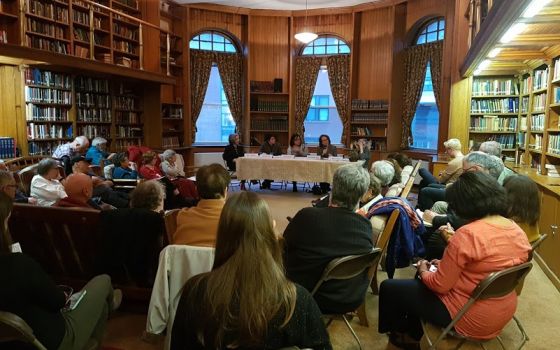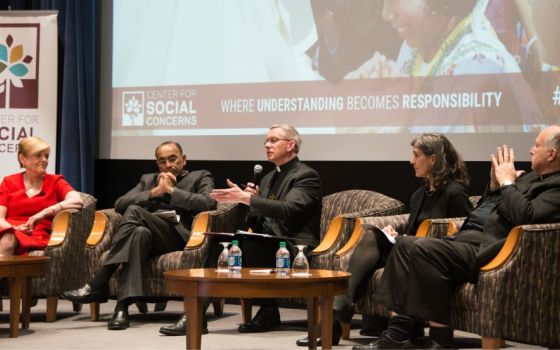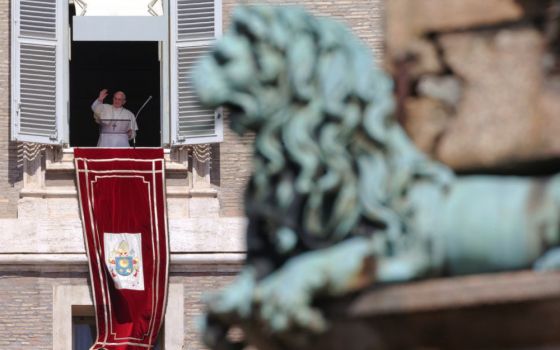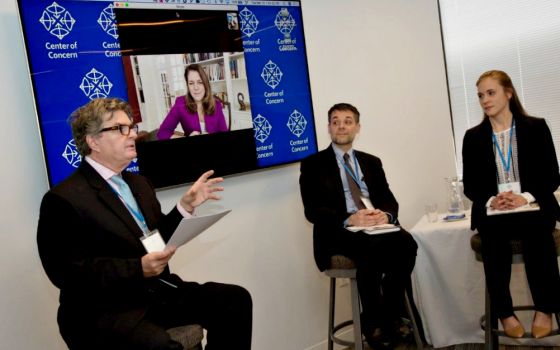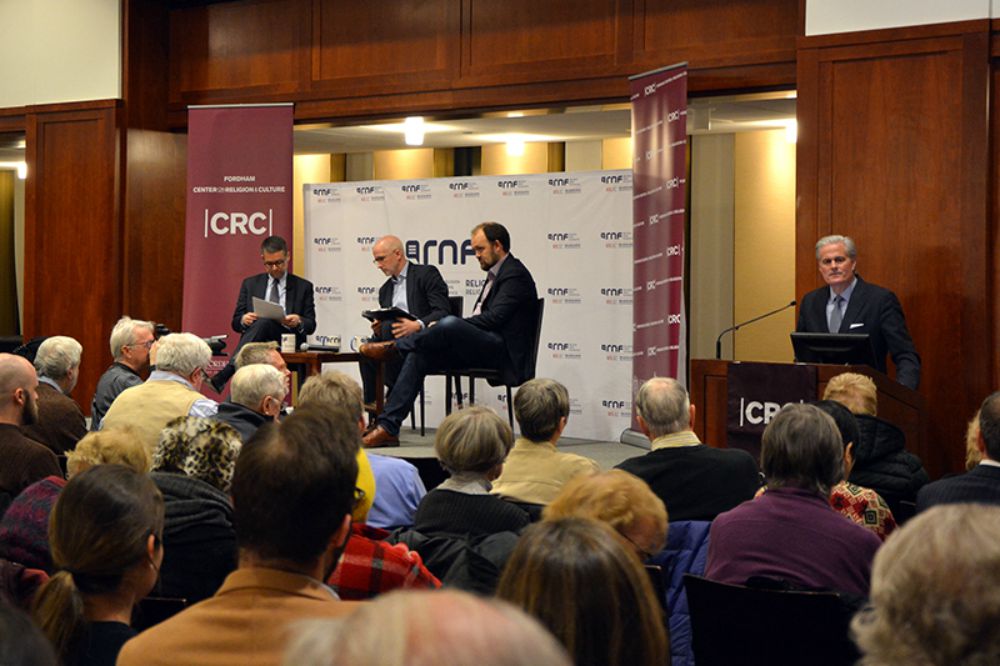
Religion News Foundation CEO Tom Gallagher, right, speaks during the Francis@Five public debate at Fordham University's Lincoln Center campus in New York on Jan. 31. (RNS/Jack Jenkins)
Ross Douthat and Massimo Faggioli usually keep their debates about Pope Francis confined to that precinct of cyberspace where Catholic traditionalists and liberals do their saber rattling.
But on the night of Jan. 31, they took their arguments person-to-person at Fordham University's Lincoln Center campus here.
Douthat, the skeptical conservative and columnist for the New York Times, and Faggioli, an unabashed Francis booster and Villanova University theologian, argued their respective cases to some 300 audience members here and to an internet linkup directed to a Canadian Catholic audience. The event was co-sponsored by Fordham's Center on Religion and Culture and the Religion News Foundation.
Mimicking the upcoming Super Bowl, with David Gibson, the Center on Religions and Culture acting as moderator/referee, Douthat won the coin toss and chose to speak first.
He argued that from his election on March 13, 2013, Francis has transformed the papacy for both good and ill. For the good, Francis has won over cynical journalists and others, transforming the public image of the church.
"A resounding success," Douthat described the pope's public relations skills, in which simple acts, such as the public embrace of a man with physical facial deformities, sent a message that Catholicism contained a vision to embrace a hurting world.
That embrace, said Douthat, was a reminder "to a post-Christian West that Catholicism is not just an opposition force locked into the culture wars."
But Douthat's central contention about Francis is that he has placed the church into a doctrinal crisis that it will have to resolve. That conflict resolution, he said, will result in either one side or another emerging triumphant, with the other embittered.
A footnote in Francis' apostolic exhortation, Amoris Laetitia ("The Joy of Love"), suggested that those who are divorced and remarried might find a way to take Communion with the church's blessing. As a result, said Douthat, Francis ruptured a moral consensus. Francis placed the Catholic Church behind a morality based upon "a liberal Protestantism in Catholic dressing," transcending centuries of tradition and Scriptural teaching based upon Jesus' firm Gospel condemnation of divorce.
Advertisement
While the debate proceeded in good humor, Faggioli countered Douthat's arguments with an appeal to Francis' intentions and church history. Francis points not to himself but to Jesus, and that has animated the power of his papacy, said Faggioli.
Much has to do with whether one believes that doctrine can or should develop.
Douthat's critique, said Faggioli, "assumes that at one point Christianity was accomplished and complete. I don't think that was true."
Francis, he said, is not a liberal reformer. He prefers to avoid rule by decree, maintaining church doctrine as it has been while promoting ways to implement it in a merciful Christ-like manner.
Douthat countered that Francis risks a Catholic civil war and possible schism, even if it doesn't happen during his papacy. The contradictions about church teaching cannot be papered over easily.
Douthat said that the majority of the world's bishops and cardinals are on the side of those who believe Francis has gone too far with what he described as a "quasi-Anglican approach" allowing local churches to go their own way on sensitive issues such as divorce and remarriage.
But those opposed to Francis are playing with fire, said Faggioli.
"It is a resistance and an insurgency," he said. "It is small, but more resilient than any of us expected."
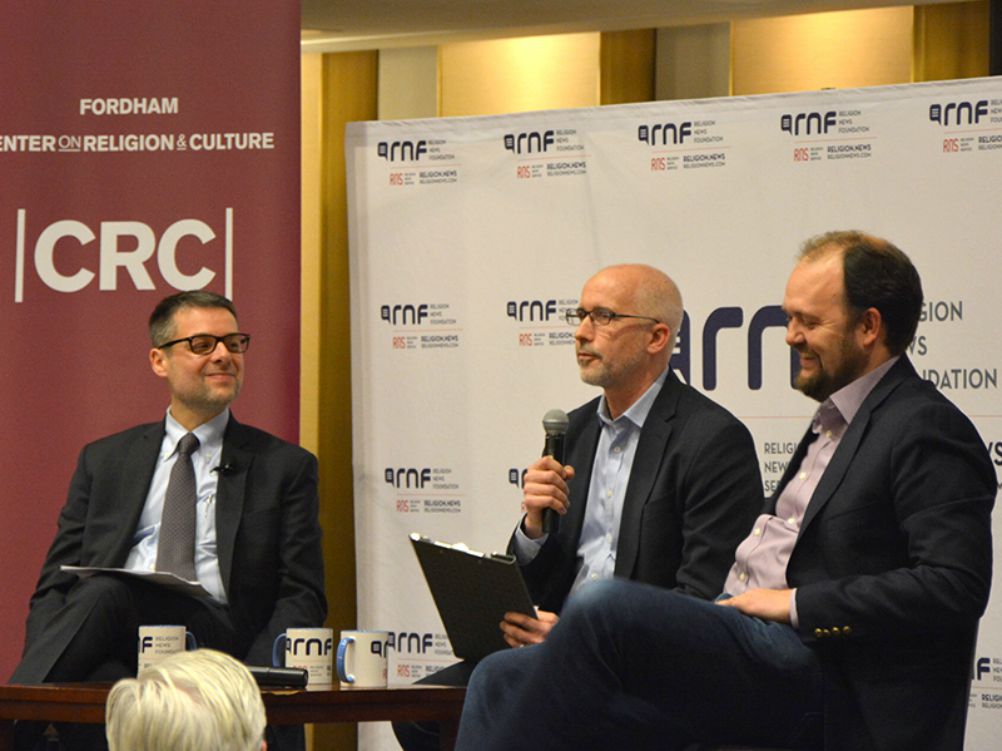
David Gibson, center, moderates the Francis@Five public debate with Massimo Faggioli, left, and Ross Douthat, right, at Fordham University's Lincoln Center. (RNS/Jack Jenkins)
The two agreed that much of the dispute is a continuation of old arguments about Vatican II, particularly in North America and Europe, that raged in the 1970s. (Both men acknowledged that it was a decade they had little personal knowledge of, as Faggioli was born in 1970 and Douthat nine years later.)
Douthat argued that the consensus built by John Paul II around Vatican II — endorsing its opening to ecumenism and its condemnation of anti-Semitism while maintaining the church's moral stances — is endangered by Francis' questioning.
While Francis' diplomatic skills and personal popularity work to soothe its current impact, "that contradiction is impossible to resolve," said Douthat. "It cannot be resolved by footnote."
Faggioli argued that Francis' commitment to the indissolubility of marriage has never been in doubt. His view of the pastoral response of the church focuses on mercy and reconciliation, imitating the Jesus in John's Gospel who welcomes the Samaritan woman at the well with a checkered marital past.
Francis is not interested in reformulating church doctrine. "Theologically he is not Hans Küng," said Faggioli.
Douthat did not agree. Francis' welcome to the divorced and remarried into Communion goes against church teaching for centuries, including its stand against Henry VIII that resulted in the split of England from Rome. He cited those African bishops who are trying to hold the line against polygamy, and said they will have a more difficult time doing so under Francis.
"It is more of a rupture and a break than a continuing development," said Douthat about Francis' opening to the divorced and remarried.
"When I look at Catholic history I see crisis and chasm," said Douthat, who argued that schism remains an option for those who lose the argument over marriage and the Eucharist. The losers may well form another church.
Faggioli remains optimistic, as he envisions a church more able to handle an evolving situation.
"Catholic teaching is not a mineral. It is an animal. It moves and adapts, it grows," he said.
[Peter Feuerherd is a correspondent for NCR's Field Hospital series on parish life and is a professor of journalism at St. John's University, New York.]





